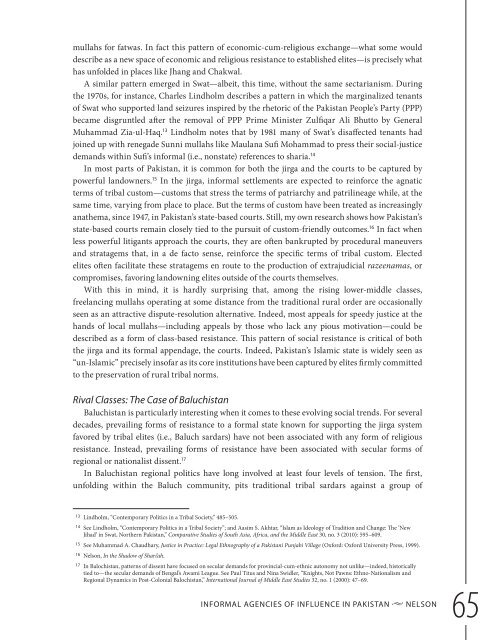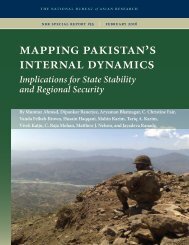pakistan’s
SR55_Mapping_Pakistan_February2016
SR55_Mapping_Pakistan_February2016
Create successful ePaper yourself
Turn your PDF publications into a flip-book with our unique Google optimized e-Paper software.
mullahs for fatwas. In fact this pattern of economic-cum-religious exchange—what some would<br />
describe as a new space of economic and religious resistance to established elites—is precisely what<br />
has unfolded in places like Jhang and Chakwal.<br />
A similar pattern emerged in Swat—albeit, this time, without the same sectarianism. During<br />
the 1970s, for instance, Charles Lindholm describes a pattern in which the marginalized tenants<br />
of Swat who supported land seizures inspired by the rhetoric of the Pakistan People’s Party (PPP)<br />
became disgruntled ater the removal of PPP Prime Minister Zulfiqar Ali Bhutto by General<br />
Muhammad Zia-ul-Haq. 13 Lindholm notes that by 1981 many of Swat’s disaffected tenants had<br />
joined up with renegade Sunni mullahs like Maulana Sufi Mohammad to press their social-justice<br />
demands within Sufi’s informal (i.e., nonstate) references to sharia. 14<br />
In most parts of Pakistan, it is common for both the jirga and the courts to be captured by<br />
powerful landowners. 15 In the jirga, informal settlements are expected to reinforce the agnatic<br />
terms of tribal custom—customs that stress the terms of patriarchy and patrilineage while, at the<br />
same time, varying from place to place. But the terms of custom have been treated as increasingly<br />
anathema, since 1947, in Pakistan’s state-based courts. Still, my own research shows how Pakistan’s<br />
state-based courts remain closely tied to the pursuit of custom-friendly outcomes. 16 In fact when<br />
less powerful litigants approach the courts, they are oten bankrupted by procedural maneuvers<br />
and stratagems that, in a de facto sense, reinforce the specific terms of tribal custom. Elected<br />
elites oten facilitate these stratagems en route to the production of extrajudicial razeenamas, or<br />
compromises, favoring landowning elites outside of the courts themselves.<br />
With this in mind, it is hardly surprising that, among the rising lower-middle classes,<br />
freelancing mullahs operating at some distance from the traditional rural order are occasionally<br />
seen as an attractive dispute-resolution alternative. Indeed, most appeals for speedy justice at the<br />
hands of local mullahs—including appeals by those who lack any pious motivation—could be<br />
described as a form of class-based resistance. This pattern of social resistance is critical of both<br />
the jirga and its formal appendage, the courts. Indeed, Pakistan’s Islamic state is widely seen as<br />
“un-Islamic” precisely insofar as its core institutions have been captured by elites firmly committed<br />
to the preservation of rural tribal norms.<br />
Rival Classes: The Case of Baluchistan<br />
Baluchistan is particularly interesting when it comes to these evolving social trends. For several<br />
decades, prevailing forms of resistance to a formal state known for supporting the jirga system<br />
favored by tribal elites (i.e., Baluch sardars) have not been associated with any form of religious<br />
resistance. Instead, prevailing forms of resistance have been associated with secular forms of<br />
regional or nationalist dissent. 17<br />
In Baluchistan regional politics have long involved at least four levels of tension. The first,<br />
unfolding within the Baluch community, pits traditional tribal sardars against a group of<br />
13 Lindholm, “Contemporary Politics in a Tribal Society,” 485–505.<br />
14 See Lindholm, “Contemporary Politics in a Tribal Society”; and Aasim S. Akhtar, “Islam as Ideology of Tradition and Change: The ‘New<br />
Jihad’ in Swat, Northern Pakistan,” Comparative Studies of South Asia, Africa, and the Middle East 30, no. 3 (2010): 595–609.<br />
15 See Muhammad A. Chaudhary, Justice in Practice: Legal Ethnography of a Pakistani Punjabi Village (Oxford: Oxford University Press, 1999).<br />
16 Nelson, In the Shadow of Shari’ah.<br />
17 In Balochistan, patterns of dissent have focused on secular demands for provincial-cum-ethnic autonomy not unlike—indeed, historically<br />
tied to—the secular demands of Bengal’s Awami League. See Paul Titus and Nina Swidler, “Knights, Not Pawns: Ethno-Nationalism and<br />
Regional Dynamics in Post-Colonial Balochistan,” International Journal of Middle East Studies 32, no. 1 (2000): 47–69.<br />
INFORMAL AGENCIES OF INFLUENCE IN PAKISTAN u NELSON<br />
65



